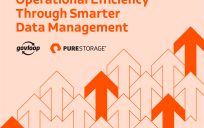Imagine this: You walk into a darkened room to turn the light on, and a little shock bolts through your body. A non-scientist would say, “Ow!” A scientist, on the other hand, would say, “I wonder if that happens every time.”
If you’ve ever said “I wonder” at any time, you are a scientist of some kind, said Jeffrey Levy, Deputy Chief of Digital Services at U.S. Citizenship and Immigration Services (USCIS). And that is at the heart of shaping data analytics to be used for mission-focused objectives. Asking the right questions — strategic questions — is an essential starting point for agencies to be data-driven and mission-driven.
In GovLoop’s recent online, “Data at Your Fingertips,” Levy and Andy MacIsaac, Director of Solutions for Public Sector at Alteryx, spoke about the main challenges and solutions for analytics deployment and operations in government.
Culture
Legacy processes and organizational silos in government make it challenging for agencies to fully leverage the large amounts of data they likely have as a strategic asset that drives mission actions. The tendency to act on feelings instead of data is common in organizations, such as dependence on the highest paid person’s opinion (HiPPO) instead of sound data, Levy said.
“Making decisions based on actual information is critical, instead of what someone had for breakfast in the morning,” he added.
To solve or ameliorate this challenge, there has already been considerable progress through initiatives such as the Federal Data Strategy, which provides a framework for federal analytics work; and public, open data sources on platforms such as data.gov and analytics.usa.gov, which provides open information for organizations to use, MacIsaac said.
Additionally, instead of a HiPPO approach, an established chief data officer (CDO) can transform and has transformed the culture around decision-making. A CDO, compared to a chief information officer or chief strategy officer, is closer to a culture officer for data analytics who is responsible for insightful data usage across teams and, consequently, establishing consistent data language agencywide.
“A CDO is a person put in place to develop the culture of an organization, not only in how certain people use data, but how an organization can use data to improve their operations, access and service delivery,” MacIsaac said.
Don’t Start With Data
Strategic questions should be a priority before any analytics deployment or enhancement begins. For many agencies, like the USCIS, the question might be: Should we be doing anything differently?
“Even if you’re in a small agency, you have to think through what functional questions you have, and don’t assume that someone has thought it all up,” Levy said. His advice: “Don’t start with data, start with questions.”
Once the questions are identified, that is where tools such as self-service analytics can help. They can further lighten the manual workload by “lowering the bar to more advanced analytics,” MacIsaac said.
“The power of self-service tools is you don’t need to have a degree in data science,” Levy said. Employees can use them to immediately start making smarter, more informed decisions in their day-to-day work. It eliminates the barrier of code knowledge so whole agencies can access data usage in a more valuable way.
Lastly, data optimization does not stop at digital tools. Communities of government employees who are likely going through the same challenges can chime in and help a whole host of analytics dilemmas. Those groups include the federal web managers email list, digital.gov communities of practice, social media groups and, of course, GovLoop.
“Join some of them,” Levy said. “You will get buried in answers from people in the communities.”
This online training was brought to you by:





I never thought about how important it is to start with questions instead of starting with data! Gonna have to check out the full training later!